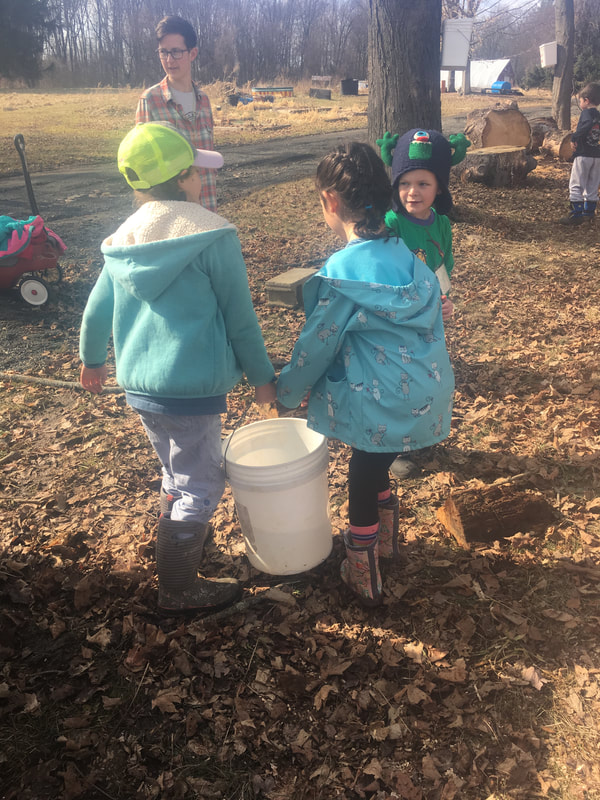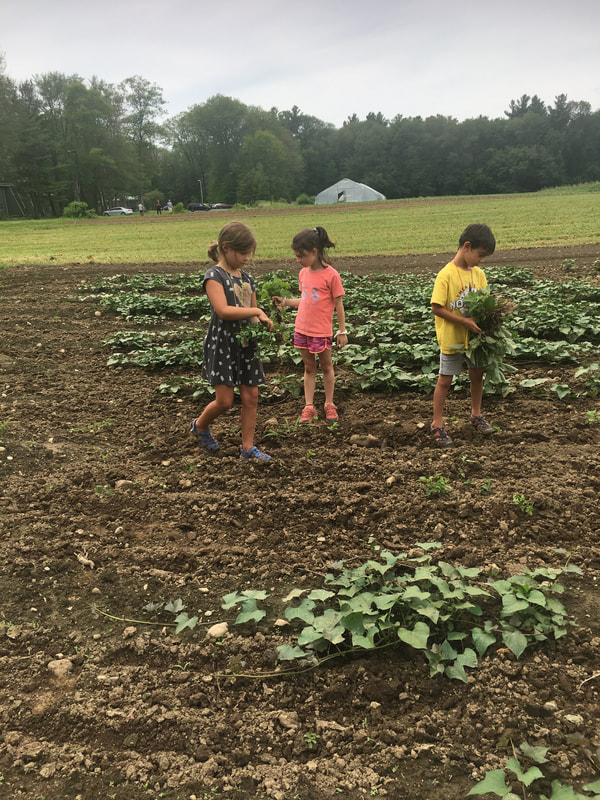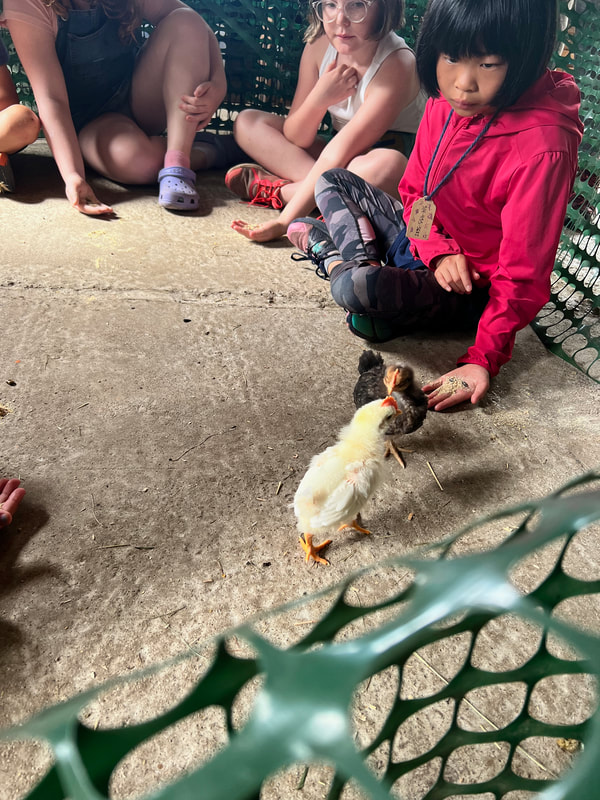Vision
Farm and Garden Camp seeks to cultivate reciprocal, conscientious, and caring relationships with place and community through growing, harvesting, and working with food and fiber in meaningful and authentic ways.
Values
Whole Person Development
We value learning space in which people feel their whole selves are welcome and all voices are heard. Through engaging in relevant and necessary work on the farm, participants make meaning out of old and new experiences, build practical and artistic skills, and grow socially and emotionally.
Shared Leadership
We value individual and collective responsibility. Through engaging in inclusive decision-making and routine care of animals, land, space, and infrastructure, participants learn to work together and discover new avenues for leadership.
Creativity & Laughter
We value silliness and song, joy and laughter, learning and play. Through singing, dancing, cooking, crafting, and more, participants explore new ideas and exercise their creative capacities in a nurturing and fun environment.
Mindfulness
We value presence and attention. Through being encouraged to listen to their bodies and what the plants and animals are communicating, participants develop their sensory awareness and their ability to focus on both details and bigger pictures.
Vibrant Food Systems
We value vibrant food systems. Through sharing recipes; growing, harvesting, and preparing fresh food; taking care of animals and learning about their place in food systems; and experiencing culturally affirming foods and food traditions, participants expand their palates and feel connected to the food webs that nourish them.
We value learning space in which people feel their whole selves are welcome and all voices are heard. Through engaging in relevant and necessary work on the farm, participants make meaning out of old and new experiences, build practical and artistic skills, and grow socially and emotionally.
Shared Leadership
We value individual and collective responsibility. Through engaging in inclusive decision-making and routine care of animals, land, space, and infrastructure, participants learn to work together and discover new avenues for leadership.
Creativity & Laughter
We value silliness and song, joy and laughter, learning and play. Through singing, dancing, cooking, crafting, and more, participants explore new ideas and exercise their creative capacities in a nurturing and fun environment.
Mindfulness
We value presence and attention. Through being encouraged to listen to their bodies and what the plants and animals are communicating, participants develop their sensory awareness and their ability to focus on both details and bigger pictures.
Vibrant Food Systems
We value vibrant food systems. Through sharing recipes; growing, harvesting, and preparing fresh food; taking care of animals and learning about their place in food systems; and experiencing culturally affirming foods and food traditions, participants expand their palates and feel connected to the food webs that nourish them.
Culture
Every camp is a unique place with a unique culture. Our camp culture:
- Appreciates the gifts of the farm and the earth, and the effort involved in feeding a community
- Celebrates both difference and commonality, both visible and invisible parts of ourselves
- Fosters awareness of self and inter-relatedness with others
- Honors strengths
- Supports articulation and embodiment of healthy boundaries
- Provides opportunities to courageously try new things and creatively self-express
- Embraces the sharing of stories, skills, talents, and joys
- Is one of care, consent, and emotional safety
Gratitude For The Land & Its Stewards
Farm and Garden Camp families and staff come from many places. Some camp families and/or staff have been here for hundreds or thousands of years; others of us are new to this place. We all come together in this Connecticut River Valley, a place where people have been tending food sources and living in reciprocity with land and animals for thousands of years.
Specifically, we come together in the ancestral homelands of the Nonotuck, Nipmuc, and Pocumtuck, an area also regularly visited and known by the Agawam to the South and the Sokoki Abenaki to the North. We are grateful for their past and present loving and living stewardship of this place. We hold in our awareness the harmful impacts of colonization on human and more-than-human communities, food systems, and people's access to healthy, sacred, and culturally relevant foods. We are grateful for the opportunity to learn, work, and play here.
We strive to actively contribute to healing land and relationships through our food education work. Please contact us if you would like to learn more about what this means to us. Here are some actions you can take:
Specifically, we come together in the ancestral homelands of the Nonotuck, Nipmuc, and Pocumtuck, an area also regularly visited and known by the Agawam to the South and the Sokoki Abenaki to the North. We are grateful for their past and present loving and living stewardship of this place. We hold in our awareness the harmful impacts of colonization on human and more-than-human communities, food systems, and people's access to healthy, sacred, and culturally relevant foods. We are grateful for the opportunity to learn, work, and play here.
We strive to actively contribute to healing land and relationships through our food education work. Please contact us if you would like to learn more about what this means to us. Here are some actions you can take:
- Visit www.maindigenousagenda.org to learn about bills that need support to move through the state legislature. Teach your campers how to look up and call their state representatives.
- Expand your understanding of interrelatedness through language learning at http://westernabenaki.com.
- Volunteer at the Wissatinnewag gardens and attend a family-friendly event with the Nolumbeka Project.
- Learn about local native history and current initiatives by following and supporting Ohketeau Cultural Center, Atowi Project, and Nipmuc Cultural Preservation, Inc.
- Get involved with the Connecticut River Conservancy and help take care of the Kwinitekw (also called the Connecticut River).
- Listen to the land and practice Gratitude.



